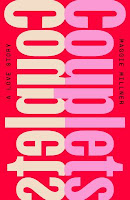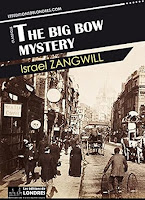Another of the great November challenges is Novellas in November. The first prompt is an overview of novella-reading from the last year. So, on with a few highlights!
The Man Who Was Thursday is G. K. Chesterton's mystery-ish novella of 1908, well before his Father Brown stories. Gabriel Syme, a Scotland Yard agent, becomes Thursday in a circle of anarchists; the mysterious Sunday is the leader. Syme is out to expose Sunday and does so in the end, but what does that signify? Was there really ever a plot? It's both thriller, but also a bit of an allegorical Piers-Plowman style of story. Entertaining and very Chestertonian. I gave it a fuller review here.Ethel Wilson's Hetty Dorval of 1947 is Wilson's first book, and a CanLit classic. The teenaged girl Frankie Burnaby is fascinated by the mysterious Mrs. Dorval after she moves to their small town in British Columbia. Mrs. Dorval seems sophisticated--maybe she's too sophisticated? (She is given the first name Hetty/Hester; think The Scarlet Letter or Adam Bede.) I'd sort of long known of the book, but read it this spring for the first time, because Alexandra Oliver's most recent volume of poetry, Hail, The Invisible Watchmen, includes a sonnet sequence based on Hetty Dorval. The novella is pretty great. (And well worth a sonnet sequence.)
Maggie Millner's Couplets: A Love Story is a verse novella that came out earlier this year. Our (female) artsy NYC heroine has a steady boyfriend, but then falls in love with an older woman. I don't know that I thought the story was astonishing, but it was entertaining enough, and I quite enjoyed the poetry, which is written in a series of (Heroic? Un?) couplets, appropriately enough. I quoted a stanza and discussed it at more length here.
Lots of Golden Age mysteries are probably effectively novellas; certainly Israel Zangwill's The Big Bow Mystery is. I read the text from Project Gutenberg, and just now copied it and subjected it to a word count. Approximately 43000 words. It came out in 1892 and is a very early locked-room mystery, one of the classics of the genre. It got its own post here.
But, hey! how about a couple of short non-fiction works, too?
I've read it a few times, but once more didn't seem to hurt. And it is short. Susan Sontag's Illness as Metaphor is about tuberculosis and cancer (she wrote a sequel about AIDS) and the way we make metaphors out of diseases--things that are really not metaphors--but bacteria, or viruses, or cellular malfunctions. It's also a very hidden autobiography--she wrote this after being diagnosed with the breast cancer that went on to kill her some years later, but doesn't mention it at all in the book. One of her main examples of illness as metaphor is Henry James' The Wings of the Dove, whose Milly Theale dies of tuberculosis. I reread Sontag after reading the James, and discussed both (and a few other odds and ends) here.But what's past is prologue (as the master says...) What novellas might I read this month? We have a picture for that, of course!
 |
| Mr. Dickens says, But these books are all so short! |
Elizabeth Smart/By Grand Central Station I Sat Down and Wept
Another classic CanLit novella. About her long-term affair with the British poet George Barker. (I believe.)
Cesare Pavese/The Moon and the Bonfires
Our hero leaves Italy for the U. S. early in the Fascist era and returns only after the war is over. What's changed?
Boris Pasternak/The Last Summer
Don't know much. 😉 The back of the book says, "Set in the winter of 1916, The Last Summer has an autobiographical basis." That, and it's shorter than Doctor Zhivago.
Patrick Modiano/So You Don't Get Lost in the Neighborhood
That makes two Nobel prize winners on this list. Hmm...
Which look good to you? Are you taking part in Novellas in November?







I love the assortment. Mine is all over the place too. And Hetty Dorval is a real favourite. That's the copy of Elizabeth Smart's book I read too. There's a terrific little (possibly even short enough for this event) bio by Kim Echlin from Women's Press. If you can't find it (no way to check TPL now, sigh!) and get badly bitten by the ES-bug I'll bring it with me next time we're back!
ReplyDeleteIs it a nice assortment--or just discombobulated. I often wonder...
DeleteHave you seen the Alexandra Oliver? Especially if you like Hetty Dorval, I think you'd enjoy the sonnet sequnce. (About 1/3rd of the book.)
The TPL website has sure been a mess lately. I'll check when I can. But drop me a note if you have some time when you're in town anyway--we can do a coffee or something.
Well you'ver read a few #Classic novellas and I'd like to read: Chesteron, Wilson andn the locked-room mystery "The Big Bow Mystery". Concering your plans, Cesare Pavese looks good and I think I would replace your Modiano choice with one of his other books "In the Café of Lost Youth" (160 pg). It just sound like a great read.
ReplyDeleteAnonymous, me again, Nancy Elin!
DeleteI have to admit to not having read any Modiano at this point. Neighborhood was an impulse purchase at the remaindered bookstore a couple of months ago. I'll have to keep an eye out for In the Café of Lost Youth.
DeleteSadly, my first read for Novellas in November, Basil King's 1918 Abraham's Bosom has proven a bit of a failure. For one, it amounts to fewer than 11,000 words. Hardly a novella, I was fooled by the layout. The second thing is that it isn't terribly good.
ReplyDeleteI'm an admirer of the once-bestselling, now forgotten Reverend King, particularly the fiction in which he challenges the Anglicanism in which I was raised. There are much better King titles.
Ethel Wilson's Hetty Dorval is a favourite of mine. With Christmas coming, I rush to add that beautiful signed limited editions (375 in total) published in 1967 by Vancouver's Alcuin Society and signed by by author, typographer and illustrator can be found online for as little as US$45. You will not be disappointed!
I've seen Basil King on your website, but haven't read any. But he is on my list to keep an eye out for. Though maybe not this one. Now off to read yours...
DeleteI read Hetty Dorval in a TPL copy that was admirably beat up--it had gotten some love over the years.
I don't think I've read any novellas this year. How strange is that?
ReplyDeleteI don't generally seek them out, but usually a few things that get called novels (like Big Bow Mystery) are really novellas.
DeleteBoth the Modiano and Pasternak caught my eye!
ReplyDeleteI have high hopes!
DeleteThis is my first time to read Novellas in November, and I joined the event mainly because I read two Claire Keegan novellas in 2023 and loved them so much I want to read more. I've always been a person who likes Very Short Things much more than Long Tedious Things.
ReplyDeleteI tend to like to sink into a long novel, but there are a lot of great novellas, too...
Delete